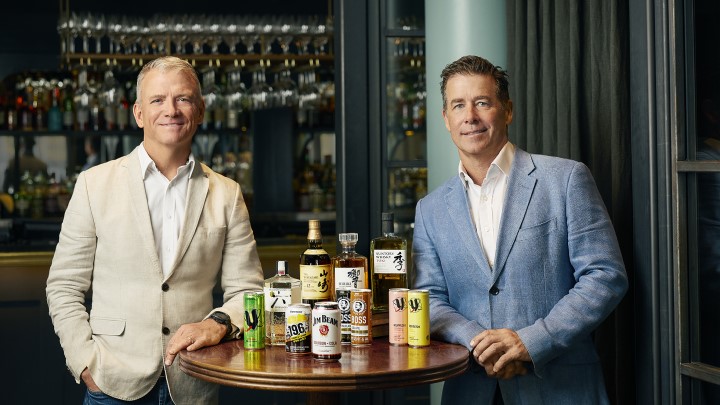After 16 years of partnership, Coca-Cola Europacific Partners (CCEP) and Beam Suntory are going their separate ways. The pair will see out their current contract, which ends in 2025, then continue to operate within the beverage space separately . Since 2007, CCEP has produced and distributed Beam Suntory’s brand portfolio across Australia, which includes products such as Jim Beam, Maker’s Mark and Canadian Club, as well as a number of ready-to-drink options and non-alcoholic beverages. It ha
has also done so in New Zealand since 2015.
Now, in the lead up to 2025, Beam Suntory has partnered with Fructor Suntory to create a new $3 billion multi-beverage partnership, Suntory Oceania, which will become the fourth-largest beverage group across Australia and New Zealand.
For the first time in years the Suntory businesses will own full end-to-end control across its entire portfolio of brands – and will be in control of their own growth capacity.
“The timing is right for [Beam Suntory and Fructor Sunctory] to come together in this partnership,” Darren Fullerton, chief executive of Fructor Suntory, told Inside Retail.
Capped capacity
While the two Suntory businesses will work together under the Suntory Oceania banner, Fullerton stressed that they will remain separate, legal entities – but that it’s going to “feel” like one company.
As to why the businesses are no longer working with CCEP, Fullerton explained that both Suntory businesses had been struggling to properly leverage their brands and opportunities with limited manufacturing capacity.
“We’ve been somewhat capped with our capacity,” Fullerton explained.
“So the focus is to bring our businesses together with the view that we can grow and innovate more, but we’ll also be looking at our customers to see how we can continue creating value.”
Suntory Oceania will start bringing in new departments, such as sales operations, revenue growth management, with a focus on technology platforms, in order to help the new business scale.
Fullerton added that the business will invest heavily in its technology in the coming years, with plans to create dedicated online stores across a number of its brands.
Net positive
Important to the new business’ ability to up its production is the creation of a new $400 million net-zero manufacturing facility in Ipswich, Queensland. Construction has already started, and Fullerton expects it to be partly operational by mid-2024, and fully operational in May 2025.
“It’s massive. You’re talking about 170,000 square metres. All the steel work is [done] and the roof has started going on. A lot of utilities are starting to be installed and we’ve got some alcohol tanks already,” Fullerton said.
“It’s also going to be a net-zero facility. There’s going to be about 14 kilometres worth of solar panels on the roof, and then we’ve got a number of sustainable investments in automation, energy efficiency, water efficiency, and a biomass boiler.”
Fullerton believes that the facility has the potential to become net-positive in the future.
What does it mean?
The impact that this decision will have on the broader beverage space is still somewhat unknown – the full effects won’t be felt until 2025, when CCEP and Beam Suntory’s partnership ends. However, it’s clear that having another major player in the market will shake things up.
Additionally, CCEP said it will continue to participate in the alcohol market beyond 2025, with plans to launch a new scalable offering in the space once its partnership with Beam Suntory ends.
“Our understanding of the spirits and alcoholic RTD market has never been stronger,” CCEP’s regional managing director for Australia, Pacific and Indonesia, Peter West said.
“Alcohol is a dynamic and important category, and when you look at the growth in alcoholic RTD beverages around the world, two of the most developed markets are Australia and New Zealand.”

